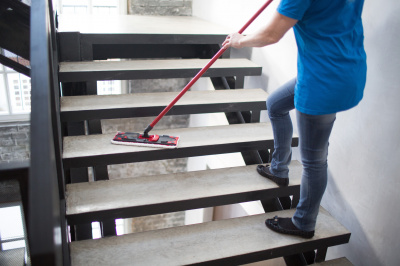What is end of tenancy cleaning?
End of tenancy cleaning (also known as ‘moving out’ or ‘end of tenancy’ cleaning) is a comprehensive and thorough deep clean of a property which is usually undertaken prior to a tenant vacating the premises. This type of clean is most commonly required when the tenant is moving out, however, it can also be requested at any other time. End of tenancy cleaning services should include all areas of the property, from top to bottom, to ensure that everything in your home is spotless. This type of clean must be carried out to a stringent standard, generally to meet the criteria set by letting agents, landlords and tenants. This type of clean covers every nook and cranny and often requires cleaning solutions such as degreasers, stain removers, mould-remover, and heavy-duty scrubbing tools. End of tenancy cleaning usually covers floors, windows, kitchen appliances, bathrooms, and furniture; however, the number of items covered by a tenancy cleaning service will vary from property to property.
What is domestic cleaning?
Domestic cleaning is the practice of keeping a home clean and tidy on an ongoing basis. It usually involves regular cleaning of the entire house or specific areas within a house, such as bedrooms or bathrooms. Domestic cleaning tasks can include wiping surfaces, vacuuming carpets, mopping floors, dusting, and cleaning windows, mirrors and skirting boards. Some domestic cleaners may also be able to offer additional services such as ironing, taking out the rubbish, or laundering bedding and towels. Domestic cleaners can be employed by individuals, families, or businesses to perform regular or one-off cleans, depending on their needs. Domestic cleaners typically work flexible hours and are usually paid on an hourly basis.

Need assistance finding end of tenancy cleaning near you?
Get a QuoteWhat are the differences?
The main difference between end of tenancy cleaning and domestic cleaning is the level of cleaning and detail required. End of tenancy cleaning is usually a much more intensive process, as it must be carried out to a stringent standard. This means that all areas of the property must be thoroughly cleaned; even those which may have been overlooked during general cleaning. End of tenancy cleaning also usually requires the use of specialist cleaning solutions and equipment to remove stubborn dirt and grime. Domestic cleaning is generally less intensive than end of tenancy cleaning and is usually focused on regular cleaning tasks such as wiping surfaces, vacuuming and general tidying.
What are the benefits of end of tenancy cleaning?
End of tenancy cleaning is essential in order to ensure that a property is left in a clean and presentable condition before the tenant moves out. This helps to protect the reputation and future rental prospects of a property. An end of tenancy clean can also help to keep up the value of the property and protect its appearance for future viewings. End of tenancy cleaning services can also help to save time and effort for landlords and tenants alike. A professional tenancy cleaner is usually well equipped with the necessary expertise and knowledge to carry out a comprehensive clean, thus saving you the time of having to do the clean yourself.
Why do I need an end of tenancy clean?
An end-of-tenancy clean is essential if you want to ensure that your property is returned to you in good condition when a tenant vacates. It is important to have the property professionally cleaned in order to guarantee that all areas have been cleaned to a satisfactory standard. An end-of-tenancy clean can also help to minimise any disputes between the landlord and the tenant, as it demonstrates that the property has been looked after properly. Professional tenancy cleaners understand what is expected of them and can carry out a thorough clean to ensure that the property meets the standards set by the letting agency or landlord. This will help to ensure that the tenant receives their full deposit back when they move out.
In this article:
